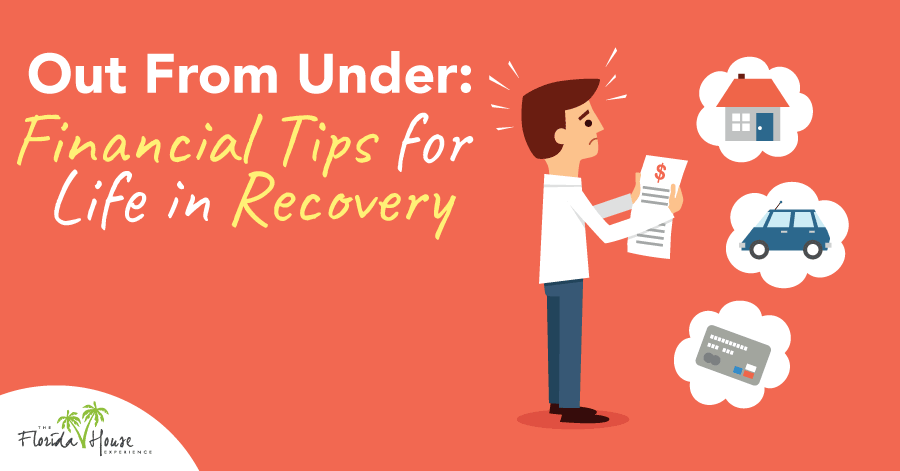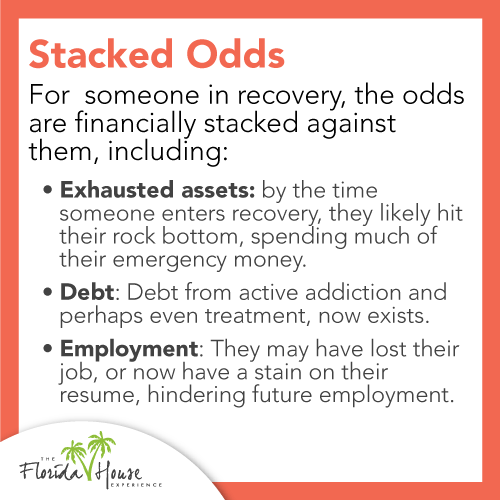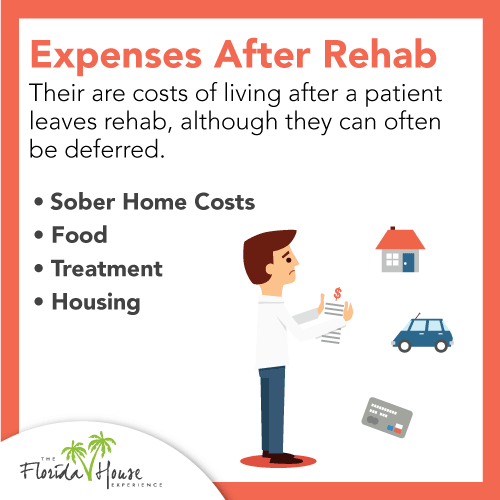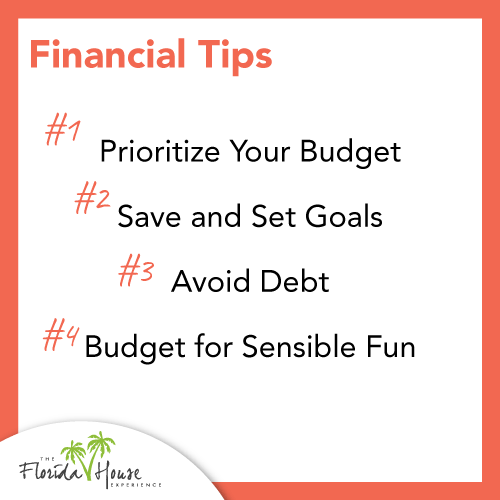
Making the decision to get clean can be overwhelming emotionally, physically, mentally and financially. Choosing to go to rehabilitation effectively upends the way you’ve been living for months or even years, replacing your home and your routines with life in a treatment center. The process of getting help alone is a big step, but dealing with the changes that accompany sobriety can be equally monumental. From potential job loss to changes in living situations, the financial future can be foggy indeed for those in recovery.
Financial Stressors in Recovery
 While there’s a lot to process about getting help, the financial upheaval can be among the most significant. While insurance will often pay for a stay in detox or inpatient rehabilitation, the path forward becomes a little less clear upon release. Some jobs may be protected by a combination of the Family and Medical Leave Act protections and an understanding employer with short-term disability coverage, but this isn’t guaranteed. Those working in hourly positions or at part-time jobs are unlikely to be as lucky; in these situations, most people must sacrifice their paychecks in hopes of finally getting clean.
While there’s a lot to process about getting help, the financial upheaval can be among the most significant. While insurance will often pay for a stay in detox or inpatient rehabilitation, the path forward becomes a little less clear upon release. Some jobs may be protected by a combination of the Family and Medical Leave Act protections and an understanding employer with short-term disability coverage, but this isn’t guaranteed. Those working in hourly positions or at part-time jobs are unlikely to be as lucky; in these situations, most people must sacrifice their paychecks in hopes of finally getting clean.
You may have entered treatment with some savings, but this isn’t likely — most users in active addiction commit all excess funds to the purchase of drugs and alcohol. And while a spouse may have a job or parents may maintain insurance coverage, these options aren’t available to everyone, especially those who burned bridges with support systems while in the depths of addiction.
As such, it’s not uncommon for those transitioning from inpatient care to find themselves lost, isolated and without resources to pay for the next steps in recovery. Unfortunately, financial burdens can be a driver for relapse, making it all the more important that wise financial choices are made early in the process.
Those hoping to find themselves back on the solid financial ground are encouraged to commit as much time and energy to recovery as possible. While this may seem counter-intuitive — those without resources are eager to get back into the workforce — taking the time to build a solid foundation for sobriety is far more valuable than any job could ever be.
Living Expenses After Treatment
 For those recently released from residential rehabilitation, the question of financial options becomes one of the utmost importance. For those without many financial resources, it’s only natural to want to skip partial hospitalization or intensive outpatient programs and return to the workforce. However, this is strongly discouraged. A step-down approach to treatment can be exceptionally beneficial in reducing the likelihood of relapse and encouraging healthy lifestyle changes.
For those recently released from residential rehabilitation, the question of financial options becomes one of the utmost importance. For those without many financial resources, it’s only natural to want to skip partial hospitalization or intensive outpatient programs and return to the workforce. However, this is strongly discouraged. A step-down approach to treatment can be exceptionally beneficial in reducing the likelihood of relapse and encouraging healthy lifestyle changes.
Sober living houses are wonderful resources for those in a transition period, providing a safe, stable environment centered around sobriety. Offering a place to live while continuing treatment, these opportunities provide an atmosphere that prioritizes sobriety and positive changes to habits and behaviors. In addition to abstaining from drugs and alcohol, residents must also follow rules related to chores and curfew.
Sober living arrangements tend to be more affordable than renting a house or apartment, averaging around $450 to $800 per month based on location and program features. Utilities are included, and rooms are fully furnished. This provides a reduction in stress — other than food and transportation, all basic needs are covered.
For those without savings, paying for sober living may seem daunting, but there are many avenues available. Promissory notes may be available to fund several months of rent, food, and transportation, providing a low-cost safety net to take the focus off finances while in recovery. In some cases, insurance can also pay for some or all of sober living costs, and grants may be available from charitable organizations. Further, some intensive outpatient programs can allow time for part-time employment, making it easier to embrace sober living without a financial burden.
Before rejecting the concept of sober living and the advantages of outpatient programming, consider all funding options to best encourage your chances of success in sobriety.
Financial Tips in Recovery
 Finding solid financial footing after rehabilitation can feel almost impossible, but wise steps taken early can add up to stability later on. Keep these tips in mind when working toward financial freedom after the completion of rehabilitation.
Finding solid financial footing after rehabilitation can feel almost impossible, but wise steps taken early can add up to stability later on. Keep these tips in mind when working toward financial freedom after the completion of rehabilitation.
Prioritize Your Budget
As you restart your career and begin earning money again, getting your budget in line is very important. Spending patterns are often in disarray during addiction, but your recovery is the perfect opportunity to return to healthy habits.
To determine your budget, evaluate average monthly inflows compared to outflows. If you make $2,000 per month, your expenses shouldn’t be higher than this amount. Keep basic rules for budgeting in mind, too; for example, housing shouldn’t exceed 30 percent of your income. There are plenty of ways to cut corners when necessary, too, like exchanging cable for streaming services or switching from a pricey phone contract to a pay-as-you-go cell plan. When making a purchase, ask yourself “Do I need this to live?” If the answer is no, think carefully before proceeding.
Save and Set Goals
As you begin the process of rebuilding your finances, any goal you set may seem so far away — but everyone has to start somewhere. When you have clear financial objectives outlined, you can begin to make smart decisions, step by step. Without the expense that goes into supporting a drug or alcohol addiction, it’s much more feasible to start saving for the future.
Setting large goals, like saving up a down payment, may seem monumental, but determining a monthly savings goal, like $100, can feel much more feasible. Come up with an overarching achievement, and set benchmarks to get there.
Avoid Debt
When you’re finally out of treatment and re-enter the workforce, the freedom to return to favorite restaurants, stores, and entertainment destinations can be overwhelming. However, this can lead to overspending, increasing your likelihood of unnecessary debt. The average American has $38,000 in personal debt excluding mortgages, and that’s not the position you want to be in so soon after treatment.
Some debt is okay, like a home loan or an affordable car payment, but avoid credit cards and other forms of unsecured debt. If you can’t afford to make a purchase outright, you can’t afford to make it at all.
Budget for Sensible Fun
When money is tight and your focus is on sticking to a budget, foregoing optional expenses and working toward goals, it’s easy to feel pigeonholed and restricted.
Before going to rehabilitation, most of your money was likely invested in the pursuit of fun, like the next dose to get high. Shutting out enjoyment entirely can increase the temptation of old habits, putting sobriety at risk. Instead of letting financial concerns outweigh your recovery efforts, make room in your budget for a little fun every once in a while, like an affordable dinner out or a night at the cinema.
Learning how to live a happy, healthy life after treatment may take some time, but an intelligent approach to finances will make a difference. By understanding the advantages of continuing to invest in your sobriety as well as the benefits of a solid financial plan, you can start your recovery off on the right foot.






